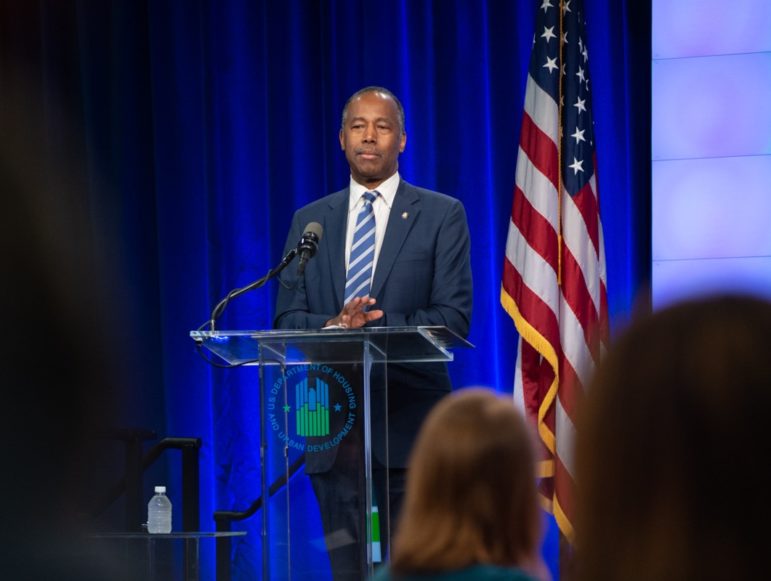
HUD
HUD Secretary Ben Carson
The Trump Administration has worked to create a climate of confusion and fear for immigrant families and communities. Their policies have forcibly separated children from their families at the southern border and created widespread anxiety with increased ICE raids. Last year, the Administration proposed a new “public charge” rule that would hold the use of certain federal benefits, including housing assistance, against legal immigrants applying for green cards and seeking admission into the U.S. The Administration further is considering proposing a rule that would make the use of benefits a basis for deporting legal immigrants, including legal permanent residents who are individuals with green cards. Now, the Administration proposes putting immigrant families and others at risk of eviction from their federally subsidized homes.
The latest insidious proposal targeting immigrant families comes from Ben Carson, secretary of the U.S. Department of Housing and Urban Development (HUD). Secretary Carson proposes evicting families who have ineligible immigrant members, including undocumented immigrants, from public and other subsidized housing, putting them at high risk of homelessness. The rule would also impose new documentation requirements for U.S. citizens and individuals 62 years old or older receiving or applying for housing assistance.
To be clear: federal housing programs do not support undocumented or otherwise ineligible immigrants. Doing so is clearly not permitted by federal law or regulations, and it does not occur in practice. Furthermore, being “ineligible” for housing subsidies is not equivalent to being undocumented. There are many immigrants with legal status who are ineligible for certain federally subsidized housing. Examples include immigrants with employment and student visas as well as U-visa holders, who are crime victims that have suffered significant abuse while in the U.S. and are assisting law enforcement and government officials in prosecuting the perpetrators of the criminal activities.
These immigrants who have legal status can be part of “mixed status” households. These are households – fewer than 0.5 percent of all households receiving HUD subsidies – where ineligible family members are permitted to live with eligible family members who receive a federal housing subsidy. The subsidy is strictly prorated to provide housing assistance for only the eligible family members. Under federal law, housing providers of these programs must ensure that subsidies do not benefit ineligible family members. In practice, a mixed status household pays for more rent out of pocket than do similarly situated and sized households. In all cases, mixed status households pay at least 10 percent more rent than other families in similar units and, in many cases, they pay much more.
For example, imagine two neighboring families. Each has two people: a mother and her child. Each family is extremely low-income and lives in the same-sized public housing unit. In one family, both the mother and child are U.S. citizens. In the other family, the mother is a U-visa holder and her child is a U.S. citizen. Under current law and practice, the family headed by the mother with a U-visa receives half the subsidy and must, therefore, pay out of pocket as much as twice the monthly rent as her neighbor. Secretary Carson now proposes to evict this family from their home.
Secretary Carson’s proposal would prohibit approximately 25,000 mixed status families from living in public and other subsidized housing. Families with members who are deemed “ineligible” will be evicted from subsidized housing in 18 months or much sooner. This leaves mixed status families with the impossible choice of splitting up so that some family members can continue to be assisted or forgoing the assistance so that the family can stay together. According to HUD’s own estimate, more than 55,000 deeply poor children—all American citizens or lawful permanent residents—will be evicted from subsidized housing for which they are eligible, putting them at high risk of homelessness.
The rule would also affect about 120,000 elderly immigrants currently receiving HUD assistance as well as nine million U.S. citizens who are receiving subsidies. Given that half of these citizens are elderly or have disabilities, producing proof of citizenship documents will be extremely difficult for these populations. If they cannot provide the proper proof of citizenship or immigration status, then their subsidies would be terminated, further increasing homelessness.
Contrary to HUD’s public statements, the proposed rule is not about keeping undocumented immigrants from receiving federal housing assistance. The law already prohibits undocumented immigrants from accessing these subsidies. The rule is not about shortening waitlists for subsidized housing; HUD’s own analysis shows that this proposal would do little to free up new units. If Secretary Carson were truly concerned about the nation’s affordable housing crisis, he would not have recently proposed to cut HUD’s budget by 20 percent. The true purpose of this proposed rule, then, is to advance the Administration’s xenophobic agenda and to incite baseless fears about immigrants and their families. We must not stand for it.
Diane Yentel is President and CEO of the National Low Income Housing Coalition. Karlo Ng is Supervising Attorney at the National Housing Law Project and an NLIHC board member.









2 thoughts on “Opinion: Trump Admin’s Latest Anti-Immigrant Proposal Would Harm Thousands of Legal Residents”
What’s a “deeply poor” kid? All kids not named Trump a have a negative income so what makes one “deeply poor”?
Why wouldn’t people have proper proof of citizenship if they are Legal immigrants? If they can’t produce the documents, my guess is that the majority are probably not legal. Subsidy should not be giving to those who can’t prove it.